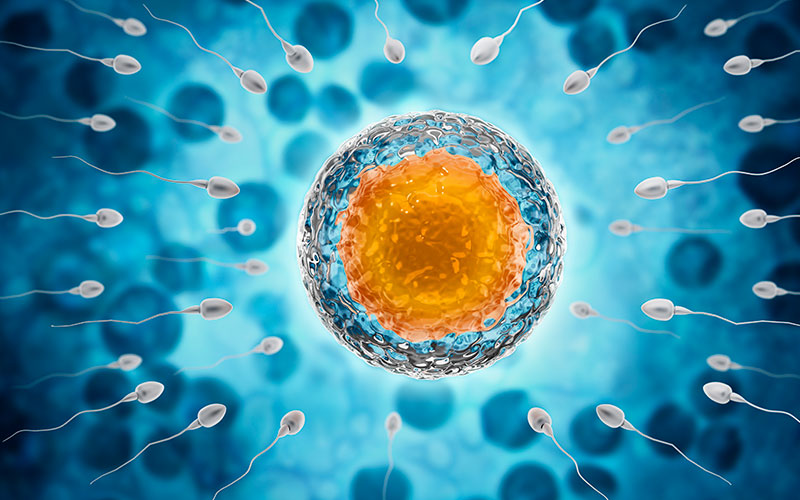- Home
- Growth Hormone
- Growth Hormone
- Growth Hormone Deficiency
- Growth Hormone Therapy
- Growth Hormone Injections
get startedThe Most Effective Hormone Replacement TherapiesHow Does Testosterone Affect Sperm?
Testosterone has an impact on sperm count and male fertility, but not necessarily in the ways, you might think.
Testosterone plays a role in sperm production, also known as spermatogenesis. Testosterone is a necessary ingredient for spermatogenesis. However, it is other hormones, and not testosterone, that drive the production of sperm. The pituitary gland produces follicle-stimulating hormone (FSH) and luteinizing hormone (LH). It is LH that stimulates the testes to release testosterone. When in balance, testosterone works with FSH to help to create healthy sperm.
You might think since testosterone is a male hormone and it improves all other male traits such as strength and musculature, that increasing testosterone through testosterone injections improves sperm count. In fact, quite the opposite is true; too much testosterone actually has a kind of contraceptive effect. So, men who are looking to become fathers should actually avoid taking supplemental testosterone.
Testosterone and Male Fertility
Not every issue with a man’s ability to father a child has to do with sperm count. Other issues that can also influence a man’s fertility include:
- Libido or sex drive
- Erectile dysfunction (ED)
- Sperm motility, or their ability to swim
Maintaining a healthy testosterone level is related to all the above. Low testosterone can lead to decreased sperm count and/or weak or less motile sperm. In addition, men with low testosterone often have low libido, as well as ED. Having trouble performing sexually, of course, also negatively impacts your ability to get your partner pregnant.
Testosterone is a necessary ingredient in sperm production.
Low Testosterone’s Effect on Male Fertility
Contrary to what you might think, low testosterone does not cause a low sperm count. While low testosterone can lead to a number of sexual health issues such as erectile dysfunction or loss of libido, it does not directly impact sperm count or male fertility. This is because, as we mentioned earlier, spermatogenesis is actually stimulated by hormones other than testosterone.
Testosterone is indeed necessary for sperm production, but the level in the testes where sperm are produced is so many times higher than in the blood that even men with low or borderline testosterone levels usually have enough testosterone for normal sperm production. In fact, treating low testosterone with testosterone injections could have the side effect of lowering sperm count!
This is because testosterone therapy can decrease sperm production by decreasing a man’s levels of FSH, which is important for stimulating sperm production.
Is There a Link Between Low Testosterone Treatments and Male Fertility?
Testosterone replacement therapy is used to treat men with low testosterone. We know that testosterone therapy can increase your sex drive, improve your emotional well-being, and help with erectile dysfunction. So, it may seem logical to assume that testosterone replacement therapy could help men with fertility issues.
However, quite the contrary is true. Testosterone replacement is not recommended for men who want to father children. In fact, studies have shown that testosterone therapy can cause men to become infertile. Taking testosterone decreases the production of the follicle-stimulating hormone (FSH) from the brain, which is the hormone that drives sperm production. Remember, both testosterone and FSH are required for the production of sperm. The job of FSH is to signal the testes to make more testosterone, which is vital for a healthy sperm count.
But, when you’re taking testosterone injections, testosterone is added directly into the bloodstream. This "tricks" your brain into thinking that you now have enough testosterone. So, it stops releasing FSH. In the absence of FSH, sperm count can drop significantly. In fact, taking testosterone is so "effective" at lowering sperm count, testosterone is even being considered as a form of male "birth control."
Traditional testosterone therapy, therefore, is usually not considered to be a treatment for men with low sperm count. If you want to be a father, try taking the steps outlined below to increase fertility. If your issues with infertility persist, speak with your doctor or a male reproduction specialist. There are medical options that may be available to increase both testosterone production and sperm production.
Boosting Fertility When Testosterone Levels Are Low
So, if traditional testosterone replacement therapy can lead to infertility in men with low testosterone, are there alternatives to boosting male fertility when testosterone levels are low?
According to WebMD, if you have low testosterone, one way to improve sperm count is with gonadotropin injections. This stimulates the production of sperm. It may be considered as a way to increase men’s fertility when they and their partner are having trouble conceiving a child. Gonadotropin causes the pituitary gland in the brain to make and secrete the hormones luteinizing hormone (LH) and follicle-stimulating hormone (FSH), both of which are important for sperm count.
You should also make sure to follow a lifestyle of regular exercise and a healthy diet if to keep naturally keep your testosterone levels above normal if you want to become a father. Overweight and obese men tend to have lower testosterone levels because excess belly fat converts testosterone to estrogen.
Shedding those extra pounds will likely have a positive effect on your fertility. Following are some eight steps you can make to help maintain healthy testosterone levels and improve sperm count.
Testosterone replacement therapy is NOT a treatment for men with low sperm counts.
Eight Ways to Increase Testosterone and Improve Male Fertility
There are several diet and lifestyle changes that you can make that can both naturally boost your testosterone levels and therefore also increase sperm count.
- Step 1 – Get regular exercise
Exercise, particularly strength training, can increase testosterone production.
- Step 2 – Get enough sleep
Poor or disturbed sleep has been shown to reduce testosterone production and that of other critical hormones such as human growth hormone.
- Step 3 – Reduce the consumption of alcohol
Alcohol can be a testosterone killer. Excessive drinking not only lowers your testosterone level but it also raises cortisol. Cortisol suppresses the production of testosterone.
- Step 4 – If you smoke, quit. If you do not, don’t start
There have been studies that suggest that smoking can lower the levels of free testosterone in the blood.
- Step 5 – Reduce stress
Stress definitely lowers your testosterone. High stress raises your levels of the hormone cortisol. Elevations in cortisol can quickly reduce testosterone.
- Step 6 – Increase the consumption of these nutrients: Zinc, vitamin D, vitamin C, folate
These nutrients have been shown to increase testosterone production.
- Step 7 – Consider taking these nutritional supplements:
Maca root, ashwagandha, fenugreek, and CoQ10 have all been linked to boosting testosterone
- Step 8 – Avoid foods containing soy
Soy and soy-based products have ingredients that act like "pseudo-estrogens" that have been shown to cause a drop in testosterone levels.
There are some steps you can take to naturally boost both your testosterone levels and your sperm count.
Now that you know a bit more about how testosterone relates to sperm count and fertility, why not contact us today and find out more about testosterone and age-related testosterone loss.
- Growth Hormone Therapy



























